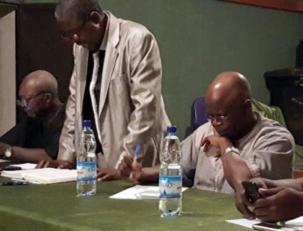Violence Doesn't Squelch Peace Process in Nigeria

Rev. Musa Manasseh, Rev. Yacobo Shamaki, Rev. Caleb Ahima
Peter Vander Meulen, former director of the CRC’s Office of Social Justice, is helping to facilitate the Wukari peace process in Nigeria. He drafted the following letter to provide supporters a progress update.
The town of Wukari in Nigeria is quiet, and despite dangerous instability in the nearby rural areas of Benue and Taraba states, examples of Christian hope and active Christian citizenship continue to be seen throughout the process of peace building.
If you google “violence in Wukari town, Nigeria,” the latest news stories that come up date from 2013 to 2015. This was the period in which multiple Christian-Muslim conflicts killed hundreds of people and destroyed a large area of the town. That was what the Wukari peace process – led by local Christian and Muslim faith leaders and supported by the CRC – was designed to stop.
So far, the absence of interreligious violence in the town and the continued work by peace-process participants toward lasting peace is encouraging.
But all is not well. Wukari is the second largest town in Taraba state, and in the rural areas of Taraba (and neighboring Benue state) the violence involving herdsmen and farmers -- the clash is between herders following traditional, nomadic tribal customs and farmers using the land for agriculture -- continues and threatens to get worse. In March 2018, 32 villagers were killed.
And just this past Sunday, July 15, media reports say, more than 35 people were killed, several houses were destroyed, and more than 10,000 people, who were taking shelter in three camps for internally displaced people, were displaced from the region. Speculation is that tension between farmers and herders was again at the center of the outbreak of violence.
One of the most troubling developments is the politicization of the security situation, meaning that senior politicians from particular parties are accusing government forces of either turning a blind eye to the violence or directly taking sides in the disputes over grazing and farming rights.
In September 2017, a peace gathering supported by funds from CRC donors and others identified “good governance” as a necessity for sustainable peace. They also noted that “good governance” was in short supply in Nigeria.
How do religious leaders and people working for peace improve the quality of governance? As peace-process organizers, we believe this is accomplished by engaging in active Christian citizenship – and, regardless of the challenges on the ground, that is exactly what is now happening.
There are three denominations in Nigeria that began as a result of the work of Christian Reformed missionaries. The leaders of the Christian Reformed Church of Nigeria (CRCN), the Reformed Church of Christ in Nigeria (RCCN), and the Universal Reformed Christian Church (URCC) report that they understand their biblical call to peace even in the face of losses and serious risks to life and property.
Rev. Caleb Ahima is one such leader. Caleb is the president of the CRCN and past chair of innumerable church coalitions and bodies. He presently chairs the Taraba state Interreligious Affairs Council.
Caleb has lost a great deal during the years of violence: many friends and parishioners, his home, his car, and nearly his life. Nonetheless, his commitment to peace continues. Recently he chaired a critical meeting of the Interreligious Council and is making plans to lead a delegation to visit the Sultan of Sokoto, other traditional leaders, and senior politicians who have the power to lead by example and directly improve the quality of governance and security in the region. Sunday’s violence in which more than 35 people were killed happened in Sokoto.
But even in the face of widespread pessimism that violence between farmers and herders will continue, it is crucial for us to embrace Christian hope.
Only through hope can we engage faithfully in active Christian leadership and witness --Christian citizenship that dares to hold elected governments accountable to govern well.
Please continue to pray for Nigeria and especially for Reformed leaders such as Caleb. The peace process is being led by courageous local Christians and Muslims of the Interfaith Peace Committee and the Peace and Justice Committee of the Nigerian Reformed Churches. They continue to work on decisions made at the last peace gathering.
After Nigerian elections next year, it may be possible to conduct another peace gathering of Muslim and Christian leaders – as well as senior politicians.
See The Banner for an article about the most recent peace process.
If you would to like to help move forward the peace process, contact Jeffrey Bolt, the CRCNA’s director of advancement:Office: (616) 224-0817 or (toll-free) 877-272-6204. Email: [email protected]


